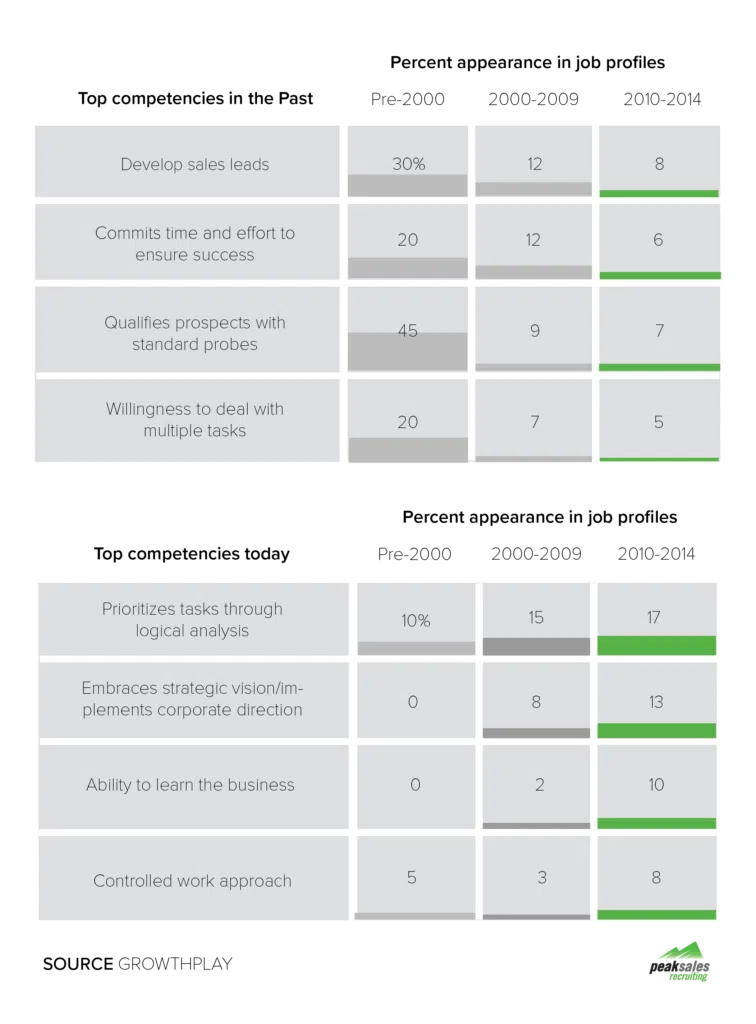Finding talented salespeople in the manufacturing sector is now more difficult than ever. However, hiring managers can tip the scales in their favor during an industrial salesperson search by shaking up their approach to recruitment.
The US manufacturing industry continues to expand, with smart manufacturing expected to grow at a compound annual growth rate of 15% between 2018 and 2023.
To live up to the promise of smart manufacturing and capture the new value being created, manufacturers need to upgrade their salesforce with top-quality, digital-savvy salespeople. In addition, they need to boost their appreciation of the hiring process simply to keep up with filling vacancies while their industry grows, baby boomers retire, and the United States faces a countrywide talent shortage.
Unfortunately, the manufacturing industry faces stiff competition for top sales talent. Seventy-three percent of manufacturers report that attracting and retaining a quality workforce is their top challenge—and according to Deloitte, 2.4 million manufacturing vacancies could go unfilled between now and 2028.
Companies are having difficulty filling manufacturing sales roles because of:
- Competition from other industries, such as tech and finance, which have been more successful at recruiting or poaching top talent
- Outdated perceptions of manufacturing jobs
- Shifting skill sets needed on the job due to the introduction of advanced technologies and digitization.
To compete with Silicon Valley tech companies and New York finance firms, manufacturing and industrial businesses need to update the way they hire. This article will provide tips for manufacturers on how to revamp hiring processes so they can recruit and retain the salesforce they need to remain competitive in the age of digital manufacturing.
It’s time for manufacturers to change the way they recruit and hire
The industry’s inability to attract millennials contributes to the current talent gap. Millennials make up the largest working population of the US economy, and as baby boomers continue to retire, any company that fails to aggressively employ millennials and generation Z will have little hope of longevity.
To keep up with shifting market demographics and the talent demands of industrial digitization, manufacturers need to:
- Recalibrate the competencies they look for in candidates
- Cultivate a workplace culture that’s attractive to a younger generation of workers
- Create paths for experienced career changers and industry-swappers to join their ranks.
Let’s look more closely at each of these strategies.
Recalibrate competency requirements for the digital era
The competencies that salespeople need in manufacturing today differ greatly from those needed ten or twenty years ago, according to research by HBR. “Competencies that, only a decade ago, were considered essential are now lower in priority,” they note.
The digitization of manufacturing and sales processes requires workers with problem-solving and critical-thinking skills. They need to feel comfortable analyzing data and learning a business’s space quickly—they need to be strategists rather than simply tactical executors. Their work is now augmented by software, algorithms, tools like Salesforce and other CRMs, business intelligence data, and personalization technologies.
Manufacturers can reflect these new sales tasks and desired competencies in their hiring criteria, job postings, interview rubrics, and even online aptitude tests. Recruiting firms can help crystallize these requirements and ensure that they are reflected in all assessments.
Cultivate your workplace culture
Candidate evaluation is a two-way street—as a company evaluates potential employees, it is being sized up as well. To recruit the sales staff needed to drive business, manufacturers need to cultivate an appealing work culture and improve their employer brand.
This is especially true when it comes to recruiting millennial workers. To attract the right talent, manufacturers should build a company that aligns with typical millennial values, which, according to Gallup, include:
- Purpose and meaning in their work
- Development and growth opportunities
- Managers who value them as people and develop coaching relationships—rather than “command-and-control” bosses
- Ongoing performance conversations instead of annual reviews
- An environment that lets them develop their strengths instead of focusing on “correcting” weaknesses.
These values—and a company’s unique culture—should permeate the workplace as well as its online presence, so it shines through to candidates. Hiring teams should work with marketing and public relations teams to develop a strategy for communicating company culture through all candidate touchpoints, including the company website, videos, employee testimonials, fairs and events, and direct communications with candidates—before, during, and after interviews.
Create paths for experienced professionals of different backgrounds
To deepen the talent pool, manufacturers should look to candidates with the relevant skill sets in different markets and from different backgrounds. Salespeople in adjacent industries may not be able to come into a role with a big rolodex of potential clients for their new company. But when vetted properly, they may have sales experience that can be easily adapted to manufacturing products and client profiles.
Manufacturers should look for candidates from other sectors that have characteristics in common with their own company. For example, a salesperson selling to enterprise clients at a large tech company will likely find it easier to transition to a similar role in a large manufacturing company—even if the products are very different. Similarly, an executive with only startup-level experience in manufacturing may have a much harder time adjusting to a large company environment compared to someone from an equally large company with no direct manufacturing experience.
A great way to tap into talent from different industries is by partnering with a recruitment firm with visibility into neighboring talent pools.
Create and refine a recruitment structure
The best way to put these principles into action is through a structured recruitment process.
Structure allows companies to start recruitment early—it is important to develop a pipeline of sales talent long before the need to fill a vacancy arises. Reaching out to potential candidates early and building a relationship with them over time can be crucial. This is known as the candidate nurture strategy and it should involve targeted, personalized messaging to prospects through email, text, and social media. To organize candidate nurture campaigns, many employers make use of CRMs or applicant tracking systems.
Structured recruitment also means involving the relevant stakeholders at the right time. C-level executives in finance, marketing, and HR—as well as sales managers—should all be aligned on which candidates will be brought in for interviews. It is also wise to involve sales staff in interviews and invite their input on candidates. After all, this is the team your candidate will eventually join, and your existing staff will arguably be the biggest influence on the successful integration of a new hire.
Interview processes should be rigorous and well-planned to avoid “gut feel” hires. Vetting should include a quantitative screening process to test for the specific traits needed for a sales position, as well as phone and in-person interviews. This should be supported by a structured rubric, in which each candidate is asked the same questions, to compare answers. Decision makers should reference the rubric to understand hiring objectives and see which questions were asked.
Follow-up between and after interviews is key. Early in the process, there should be a delegated point of contact who will always be available to answer candidate questions swiftly. After interviews, candidates should be followed up with in a timely fashion without undue delays between their second or third interviews. If candidates feel they have been left hanging, they may take their skills elsewhere.
Offer competitive compensation, which is a must-have to convince top talent to join a new firm or switch to a new industry. Salaries should be in line with, or above, industry benchmarks. According to a survey we conducted at Peak Sales, the average base salary of manufacturing sales managers is $102,843, with $134,373 OTE (in 2019).
Invest in retention
Once the right talent is on board, it’s vital to retain them. Turnover is costly, and replacing an employee costs an average of one-fifth of their salary. In sales, the problem of turnover is particularly acute, with the average sales rep remaining at their post for only eighteen months. Considering recruitment fees, onboarding, and potential lost revenue from missed leads, it costs upwards of 115K to replace a sales rep.
Retaining staff is the cheaper alternative. To make that happen, it’s helpful to first understand why sales reps might leave their current position. According to SiriusDecisions research, the top three reasons are:
- Inadequate compensation (89%)
- Lack of connection with leadership or incompetence of leadership (60%–80%)
- Concerns about the company’s ability to meet market needs (75%)
Given that the top reason for voluntary departure is insufficient compensation, industrial companies need to pay careful attention to payment structures and employee expectations. They should design compensation packages that reward good performance through bonuses, raises, and quotas.
Beyond the salary investment, companies need to show sales staff that they are valued through opportunities for career development and engaging with company leadership. This involves regular check-ins and feedback from management, periodic training and coaching, mentorship programs that pair senior and junior team members, and clear paths to promotion. Manufacturers can also offer flexible work hours to accommodate professional conferences or training programs and improve work-life balance.
Sales staff can also be supported by investing in up-to-date sales technology. Sales reps spend only 41% of their time selling—the rest is spent on admin activities, like data maintenance. The proper sales operations teams, alongside top-of-the-line CRMs, video conferencing, business intelligence data, and integrated systems, can save time and give reps more energy for their clients and strategic work.
Finally, the most motivated sales staff want to see that their company is doing well and has a plan to do even better. Sales leaders should use data-backed insights to improve operations and sales strategy, strengthen the sales playbook, communicate it, and create the resources for sales staff to execute it.
Final Thoughts
To win the battle for top talent, manufacturers need to adjust their recruitment tactics to match the current talent pool characteristics and market demands.
Some specific actions manufacturers can take to develop the ideal sales team include:
- Recalibrate candidate competency requirements to screen for salespeople who have technical and critical thinking skills
- Cultivate a workplace culture that appeals to a younger generation of workers, and communicate it to candidates in person and through online touchpoints like the company website
- Expand the talent pool by recruiting salespeople with transferable experience from outside the manufacturing industry
- Create a systematic and repeatable recruiting framework with structured assessments, interviews, and intentional follow-up processes
- Retain sales talent by supporting them with the right compensation, professional development, technology, and a winning sales strategy.
There is no one-size-fits-all when it comes to recruiting. Rather, each company should craft a recruiting process to match their company culture and talent needs. At Peak Sales, we help employers do this with our proprietary P95 Assessment Process, which fills critical roles faster and reduces ramp-up time and training requirements.
Want to learn more about staffing your team with the best salespeople? Contact Peak Sales Recruiting today.
Related posts
Latest posts by Ryan Thornton (see all)
- 3 Ways Your Employees Will Sabotage Hitting Year End Targets – December 27, 2023
- 7 Ways to Hit Your Year End Target With Ease – December 20, 2023
- How to Handle Counter Offers — and Win Top Talent – December 18, 2023





